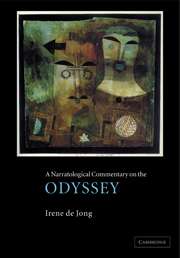Book contents
- Frontmatter
- Contents
- Preface
- Glossary
- Commentary
- Book One
- Book Two
- Book Three
- Book Four
- Book Five
- Book Six
- Book Seven
- Book Eight
- Book Nine
- Book Ten
- Book Eleven
- Book Twelve
- Book Thirteen
- Book Fourteen
- Book Fifteen
- Book Sixteen
- Book Seventeen
- Book Eighteen
- Book Nineteen
- Book Twenty
- Book Twenty-one
- Book Twenty-two
- Book Twenty-three
- Book Twenty-four
- Appendix A
- Appendix B
- Appendix C
- Appendix D
- Appendix E
- Appendix F
- Bibliography
- Index of Greek words
- Index of subjects
Book Six
Published online by Cambridge University Press: 23 March 2010
- Frontmatter
- Contents
- Preface
- Glossary
- Commentary
- Book One
- Book Two
- Book Three
- Book Four
- Book Five
- Book Six
- Book Seven
- Book Eight
- Book Nine
- Book Ten
- Book Eleven
- Book Twelve
- Book Thirteen
- Book Fourteen
- Book Fifteen
- Book Sixteen
- Book Seventeen
- Book Eighteen
- Book Nineteen
- Book Twenty
- Book Twenty-one
- Book Twenty-two
- Book Twenty-three
- Book Twenty-four
- Appendix A
- Appendix B
- Appendix C
- Appendix D
- Appendix E
- Appendix F
- Bibliography
- Index of Greek words
- Index of subjects
Summary
Odysseus' three-day stay with the Phaeacians, his last adventure on his way home, is narrated at considerable length: 6.1–13.187. In many respects the Phaeacians occupy a middle position: they are ‘close to the gods’, receive the gods at their tables, and lead a life of luxury and carefree bliss like theirs, and yet like all mortals they pray to the gods and are punished by them; they were once associated with the Giants and Cyclopes (the Phaeacians once lived near the Cyclopes; a forefather of the royal family of the Phaeacians was king of the Giants; Poseidon is the father of both the Cyclops Polyphemus and the Phaeacian Nausithous), but at some stage distanced themselves from the other two (both literally, by moving away from the Cyclopes, and figuratively, by calling the Giants ‘wild tribes’); their existence has fairytale aspects (magic ships, trees which continually produce fruit), yet the organization of their society resembles that of Ithaca, Sparta, and Pylos (king reigning as primus inter pares within a council, assembly of the people, games, heroic songs, rules of hospitality). Their intermediary nature makes them eminently suited to form the transition from the fairytale world of Odysseus' adventures to the reality of Ithaca. The marital bliss of the reigning couple and the social harmony of their people remind Odysseus of what he aspires to at home.
- Type
- Chapter
- Information
- A Narratological Commentary on the Odyssey , pp. 149 - 169Publisher: Cambridge University PressPrint publication year: 2001



